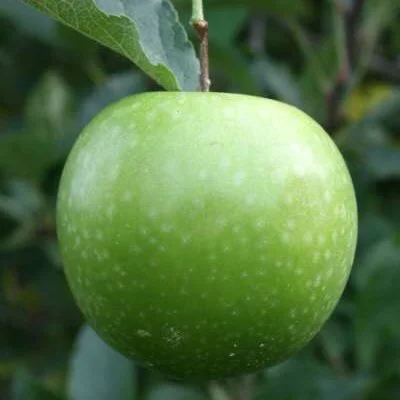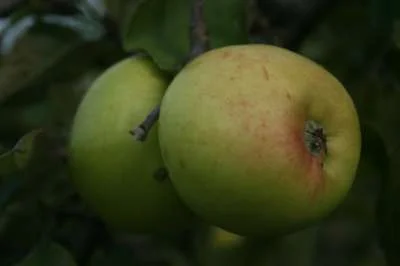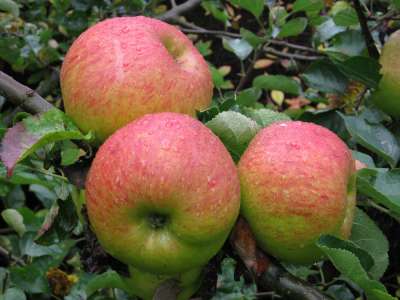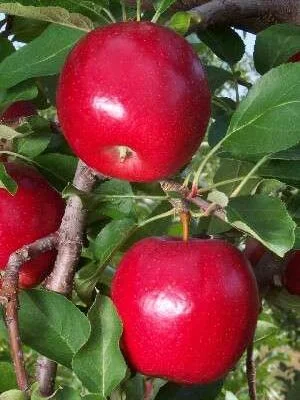Apple Tree Buyers Guide
Tree Types
There are many attractive and practical methods of growing apples.
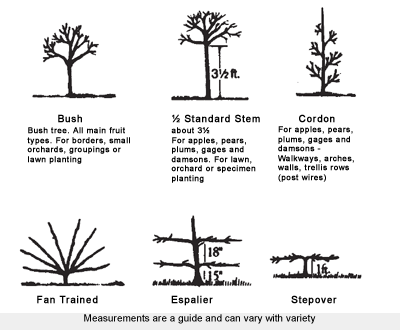
If you have a spare fence or wall why not grow them as Fan or Espalier trained? You will need around 6-8′ in height and width for each tree and any aspect can be utilized. These are very attractive forms, the Fan especially so and can bring a great deal of life to an otherwise unused wall. You can buy trees and train them yourself or purchase ready trained 2-3 year old trees.
Stepovers have been cultivated since Victorian times and are the very smallest of all fruit trees. Apples perform particularly wellbut you can also grow pears, plums + gages in this way. At scarcely 18″ tall, a step over has just 2 main laterals trained horizontally to attain an elongated’T’ shape. Used to edge a border, kitchen garden or veg area, these are very attractive and the fruits produced can be quite large.Plant 4′ apart. Buy trees on M27 stock and train them yourself or ready made trees are also available.
Cordons are very productive, space saving and easy to grow. Plant just 2-3′ apart, even as a fruiting ‘hedge’.They can be grown self supporting, as a row, or against a fence or a wall. These are grown on a single stem with the side branches pruned back a few inches. They should be planted 21/2-3ft in the row and tied to their supportingwires or wall. Pruning is simple and is carried out in the better summer months, and has none of the complications of some of the other intensive systems.They are ideal for the less experienced and the smaller garden, and are probably the most productive of all growing systems. All varieties are available for cordon growing.
Dwarf apple trees make a great addition to any garden environment, and at Chris Bowers we sell some of the highest quality trees available.As our dwarf apple trees are rigorously tested against viruses, you can be sure that fruits will be delicious and of the quality thatour customers come to expect from us.
Fruiting Hedge: A very productive and attractive screen can be grown using apple trees on M27 rootstock.The trees are planted as upright cordons 2ft apart and prunes to form a continuous hedge, about 6’high and 12-18″ thick. In the first few years, the trees are winter pruned, but later, when the hedgehas been formed, and the desired height reached, the leader is shortened in mid August and the sidelaterals pruned back to a fruiting spur. Very simple and a combination of varieties, fruit can be produced to cover the full season. A very attractive feature for the garden.
Rootstocks
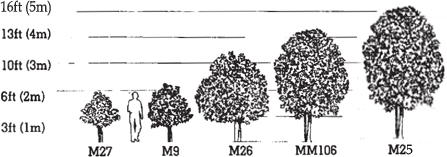
Rootstock M27 (Miniature Tree) – A miniature ‘bush’ type tree which is ideal for 18″ patio pots or the smaller garden or as an intensive orchard. Trees mature to around 6′ in height and can yield up to 30ibs when established.Plant 6-8′ apart. Yields early in life.
Rootstock M9 (Dwarf Tree) – A bush type rootstock, growing to around 8′ in height. Heavy crops – up to 25% more than M27. Great for the intensive orchard. Plant 8′ apart. Yields early in life.
Rootstock M26 (Semi Vigorous Tree) Semi dwarfing bush type tree. The standard choice for orchard planting these days. Growth an average 10-12′ high and wide – plant 12′ approx.
Rootstock M106 (Vigorous Tree) A bush rootstock for a half standard tree. Grows 14′ plus high and wide. Good for larger areas, heavy cropping.
Rootstocks M111 and M25 (Very Vigorous Tree) For large grassy areas, paddock, traditional orchard etc.
View our Apple Trees for Sale >
The Age of the Tree
Trees are offered at an age to give you the best results from planting. An older tree than this takes much longer to establishand will take longer to bear fruit. M9 and M27 are normally supplied as 1 or 2 years old). SELECTED and feathered according tovariety, which is by far the best type for planting with these new dwarfing rootstocks. The root system establishes veryquickly at this age without any ‘shock’ and settles down quickly to fruit earlier. An older tree does not transplantas well, sometimes causing failures and taking longer to come to fruit. Our recommended varieties are marked with a *.These are the varieties that will give you the best results for normal garden culture.
Free From Disease
East Malling Research Station and Long Ashlon ResearchStation have worked together to introduce selected clones which are true to name and free from all known virus disease and these are released underthe prefix E.M.L.A. Most of the fruit trees listed by us have been propagated from specified E.M.L.A. virus tested mother trees,simply the finest strains available anywhere. All rootstocks have been inspected and certified by the Ministry of Agricultureas true to type and free from virus and disease.
It has been proved by our ministry research stations that all fruiting trees give far superior results when free from all known virus infection
Very new varieties introduced from abroad are propagated from virus tested stock of that country. Not all of the older or more obscure varieties areavailable as virus tested stock, but are propagated from the cleanest, healthiest stocks available and are subject to our own rigorous standards.Apples are the most widely grown of all garden tree fruits and are a very rewarding crop to grow in the small garden as well as the large.There are varieties to suit most weather and soil conditions, and a small number of trees provide all the delicious apples that a family will want.The trees do best on a sunny site, which is sheltered so that insects can pollinate. Cooking apples are more tolerant of indifferent soil conditionsthan dessert. The sweet, succulent flesh of the dessert types at harvest time is a gardener’s just reward, unobtainable anywhere but from your own sun-kissed fruits.




